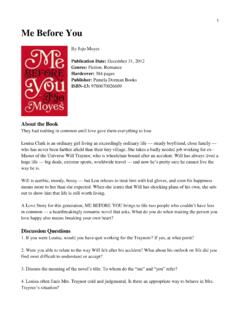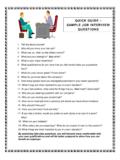Transcription of Module 1: Self-Awareness Chapter 1 LESSON 1 – DESCRIBING …
1 7 Note: If students have difficulty doing this, you may model by providing a few self - DESCRIBING words. Students should add to the list. Facilitate this process by questioning; do not make decisions for the group. Module 1: Self-Awareness Chapter 1 LESSON 1 DESCRIBING ME Materials Needed: Poster with class rules, chart paper, graphic organizers DESCRIBING Me and My Characteristics Before you begin: Explain the posted class rules. Explain the topic of the LESSON , why the LESSON is important to learn, and what the activities will be.
2 (See Guide for Conducting the LESSON .) ACTIVITIES: Step 1: Brainstorm with the group the adjectives that a person might use to describe someone. Tell students these are not physical descriptions, such as hair color, tall, short, etc. Rather, the students should find words that describe how a person acts or treats others or affects them. All suggestions should be accepted initially. Save these suggestions as they will be used again in later lessons. Step 2: Go through the list as a group and eliminate those words that the group decides are physical descriptions (see sidebar note).
3 Put the new list on chart paper. Keep the list as it will be used in LESSON 7. 8 Note: If students are reluctant to answer these questions, provide an outloud thinking model such as I learned that I like knowing that others also think I am helpful. What did you learn about yourself? Note: You may need to provide a model of this sharing by outloud thinking about situations in which you demonstrated one of the adjectives you used to describe yourself. Step 3: Have each student fill in the graphic organizer DESCRIBING Me by listing ten of the adjectives that describe himself or herself.
4 Step 4: Have the students pair off and spend the next 10 minutes discussing their adjective lists and receiving feedback on which two or three are the best descriptors of each individual. Partners should tell each other which adjectives most accurately describe them using specific examples of situations in which the partner observed the other student demonstrating these characteristics. Step 5: Rotate partners and repeat the sharing described above.
5 A third rotation is optional, depending on the size of the group and time available. Step 6: Return to the large group and debrief by asking students the following questions. For the literal questions, the facilitator may use any of the group evaluation tools identified in the Facilitator s Manual, Tips for Facilitators. For follow-up metacognitive ( how and why ) questions, call on students for individual responses: Did you and your partner easily agree on the words that you initially thought describe you?
6 Why or why not? What did you learn about yourself from this activity? 9 Alert The facilitator should be alert to students who have listed only negative characteristics for this activity. Additional time may be needed to work with these students to help them discover positive attributes that they may not realize they possess. Step 7: The facilitator should allow 3-5 minutes for the students to respond in their journals to the following questions: What have I learned in this LESSON about myself?
7 I intend to practice what I have learned by .. I need more practice on .. I have questions about .. As they are writing their responses, you can also be jotting notes about the LESSON in the facilitator s journal. HOMEWORK As a homework activity, ask students to complete the graphic organizer My Characteristics and record when and how they do things that demonstrate the descriptive adjectives they have chosen. Students should keep an informal list of what they observe about their behavior associated with those descriptions.
8 Explain that the graphic organizers DESCRIBING Me and My Characteristics will be reviewed in LESSON 5 and modified as the students learn more about themselves. Be sure to give students an opportunity to share their observations at the beginning of the next LESSON . 10 DESCRIBING ME Self-Awareness : Chapter 1 LESSON 1 From the list that you and your classmates have made, choose ten words that best describe you. Remember, you are not DESCRIBING how you look but rather how you act, feel, and treat others.
9 1. _____ 6. _____ 2. _____ 7. _____ 3. _____ 8. _____ 4. _____ 9. _____ 5. _____ 10. _____ As you and your partner discuss your lists, discuss the following questions: 1. Why did you choose the words you selected to include on the list above that describe you? 2. Why do you feel these words describe you? Give examples. 3. Which of these descriptions do you feel proud of? 4. Which of these words describe things about yourself that you would like to change? Why? 11 HOMEWORK MY CHARACTERISTICS Self-Awareness : Chapter 1 LESSON 1 Use this handout to write down situations when you notice you are doing something that shows that one of the adjectives on your list describes you.
10 Notice how you demonstrate each characteristic and how often. Keep an ongoing list of what you observe. We will look back at the list in LESSON 5. We will also take a few minutes at the beginning of our next LESSON for you to share your observations. Characteristic: _____ Situation: _____ _____ Characteristic: _____ Situation: _____ _____ Characteristic: _____ Situation: _____ _____ Characteristic: _____ Situation: _____ _____ 12 Guide for Conducting the LESSON Chapter 1, LESSON 1 The following is not intended to be an actual script, but rather a guide for conducting the LESSON .






